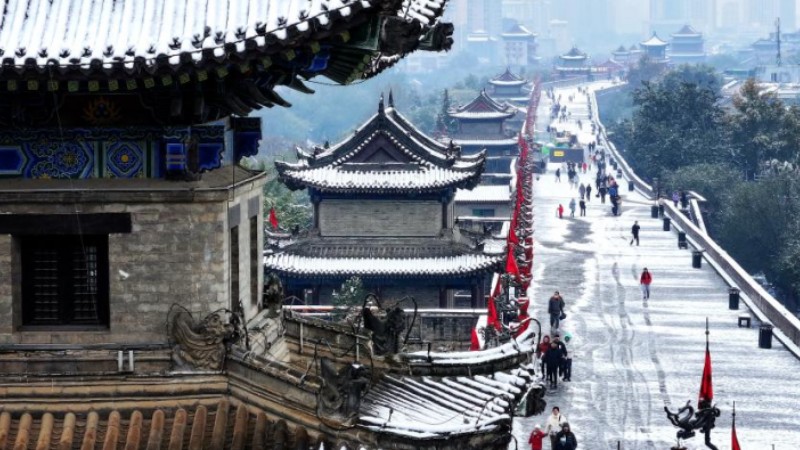Wang Yi Speaks to the Press about the Summit Meeting Between Chinese and U.S. Presidents in San Francisco
On November 15 local time, President Xi Jinping and U.S. President Joe Biden held a summit meeting at the Filoli Estate, San Francisco. After the meeting concluded, Member of the Political Bureau of the CPC Central Committee and Minister of Foreign Affairs Wang Yi gave a readout and answered questions from the press.
1. Today, President Xi Jinping and President Joe Biden held a meeting which was closely followed in the two countries and around the world. How was the discussion between the two leaders? What is most notable about this meeting?
Wang Yi: At the invitation of President Joe Biden, President Xi Jinping traveled to San Francisco for a China-U.S. summit meeting and the APEC Economic Leaders’ Meeting. Just now, the two presidents had a very good, comprehensive and in-depth meeting at the Filoli Estate. This meeting can be characterized as follows:
First, it is a strategic meeting. President Biden invited President Xi Jinping for a standalone meeting, making it different from the bilateral meetings on the sidelines of APEC. The U.S. side pointed out in particular that this is a summit meeting between China and the United States. Given the unique arrangements of the meeting, the attention from the international community as well as China and the United States, and the importance of the meeting itself, this is indeed a summit meeting of strategic significance and far-reaching impact.
Second, it is a historic meeting. It is held at a time when the China-U.S. relationship is at a critical stage. The international community needs a stable China-U.S. relationship now more than ever. This is another visit to the United States by President Xi Jinping after a hiatus of six years and another face-to-face meeting between them one year after their last one. The meeting builds on the tradition of China-U.S. summitry and has value for our times. It continues the many years of friendly interactions between President Xi Jinping and President Biden. It will stand as a milestone in the history of China-U.S. relations and a major event in international relations.
Third, it is a meeting that provides stewardship. The meeting lasted four hours and used simultaneous interpretation. The two presidents had an in-depth exchange of views face to face. They offered views guiding the most pronounced issues confronting China-U.S. relations, including adopting a correct perception of each other, properly managing differences, and advancing dialogue and cooperation. They had all-round discussions on addressing the Palestinian-Israeli conflict, the Ukraine crisis, climate change, artificial intelligence and other global challenges. They further discussed the right way for the two major countries to get along with each other and further identified the joint responsibilities of China and the United States as major countries. Together, they embraced a future-oriented San Francisco vision, and pointed the way and drew a blueprint for the sound, steady and sustained growth of China-U.S. relations.
2. At the summit meeting, what did President Xi Jinping focus on in elaborating on China’s views and position?
Wang Yi: In an atmosphere of mutual respect, the two heads of state had an exchange of views on strategic and overarching issues critical to the direction of China-U.S. relations and on major issues affecting world peace and development. President Xi Jinping gave a comprehensive and authoritative presentation on China’s position on stabilizing and improving China-U.S. relations. The most important points are as follows:
First, making the right choice for history. Are China and the United States partners or rivals? Should they engage in mutually beneficial cooperation or antagonism and confrontation? This is a fundamental question on which disastrous mistakes must be avoided. President Xi Jinping pointed out that history is the best textbook and reality is the best antidote. We hope the two countries could be partners that proactively advance a cooperative agenda in areas where their interests converge and engage in positive interactions in international and multilateral fora. This will open up a bright future for China-U.S. relations.
Second, finding the right way to get along. President Xi Jinping pointed out that despite their different histories, cultures and social systems, it is not an option for China and the United States to turn their back on each other; it is unrealistic for one side to remodel the other; and conflict and confrontation has unbearable consequences for both sides. The right approach is to respect each other, coexist in peace and pursue win-win cooperation. These three principles are important lessons learned from 50 years of China-U.S. relations as well as the history of major-country conflict and confrontation. China and the United States should put in a lot of efforts to follow the three principles.
Third, fostering a San Francisco vision for the relations. President Xi Jinping, speaking from his vantage point, pointed out that the two countries should jointly develop a right perception, jointly manage disagreements effectively, jointly advance mutually beneficial cooperation, jointly shoulder responsibilities as major countries, and jointly promote people-to-people exchanges. Through joint efforts in these five areas, five pillars can be put in place for China-U.S. relations to grow steadily and a new vision is fostered for China-U.S. relations going into the future.
3. What are the common understandings and deliverables coming out of the meeting?
Wang Yi: The summit meeting produced deliverables in a number of areas. In the spirit of mutual respect, equality and mutual benefit, the two sides discussed dialogue and cooperation in various fields, and reached more than 20 deliverables in such areas as political affairs and foreign policy, people-to-people exchange, global governance, and military and security. Some of these have already been delivered in the lead-up to the summit meeting and others were agreed upon through consultation during the summit. The main items are as follows:
On principles guiding the China-U.S. relations, the two presidents endorsed the efforts of their respective diplomatic teams to discuss principles related to China-U.S. relations since the Bali meeting and the common understandings arising from those discussions. They stressed the importance of all countries treating each other with respect and finding a way to live alongside each other peacefully, and of maintaining open lines of communication, preventing conflict, upholding the U.N. Charter, cooperating in areas of shared interest, and responsibly managing competitive aspects of the relationship. These seven points of common understanding are very important in that they provide a solid foundation for deeper discussions going forward. The leaders welcomed continued discussions in this regard.
On dialogue and cooperation, the two sides decided to step up high-level interactions, advance or launch regular consultations in such areas as commerce, economy, finance, export control, the Asia-Pacific, maritime, arms control and nonproliferation, foreign policy planning, China-U.S. joint working group, and disability issues. The two sides agreed to start consultations on extending the China-U.S. Science and Technology Cooperation Agreement, and on resuming the China-U.S. Joint Committee on Cooperation in Agriculture.
On people-to-people exchange, the two sides reiterated the importance of ties between the people of China and the United States, and committed to work toward a significant further increase in scheduled passenger flights early next year. They agreed on education cooperation and encouraged the expansion of student, cultural, youth and business exchanges.
On global governance, the two heads of state underscored the importance of working together to accelerate efforts to tackle the climate crisis, and welcomed recent positive discussions between their respective special envoys for climate, including on national actions to reduce emissions in the 2020s, common approaches toward a successful COP28, and operationalization of the Working Group on Enhancing Climate Action in the 2020s. The two sides released the Sunnylands Statement on Enhancing Cooperation to Address the Climate Crisis. They also agreed to establish government talks on artificial intelligence.
On military, security and law enforcement, the two sides agreed to resume on the basis of equality and respect high-level military-to-military communication, the China-U.S. Defense Policy Coordination Talks, and the China-U.S. Military Maritime Consultative Agreement meetings, and to conduct telephone conversations between theater commanders. They announced the establishment of a working group on counternarcotics cooperation.
The two heads of state agreed that their teams will follow up on their discussions in San Francisco with continued senior-level diplomacy and interactions, including visits in both directions.
These important deliverables are further proof of the broad common interests of China and the United States and the mutually beneficial nature of China-U.S. relations. They demonstrate that dialogue and cooperation is the only right choice for the two countries.
4. Did the presidents discuss disagreements and sensitive issues? What is China’s position and attitude on them?
Wang Yi: Of course they discussed some points of disagreement and sensitive issues. President Xi Jinping emphasized that China is committed to having a stable, healthy and sustainable relationship with the United States. At the same time, China has legitimate interests that must be safeguarded, principles and positions that must be upheld, and red lines that must not be crossed. If the U.S. side is bent on encircling and containing China under the pretext of competition, China will firmly uphold its sovereignty, security and development interests.
The Taiwan question remains the most important and most sensitive issue in China-U.S. relations. President Xi Jinping elaborated on China’s principled position on the issue. China urges the U.S. to honor the one-China principle, oppose “Taiwan independence,” stop arming Taiwan, stop interfering in China’s internal affairs, and support China’s peaceful reunification.
President Xi Jinping also made clear China’s position on issues related to economy, trade, and technology. He pointed out that attempts to curb or suppress China on economy, trade and technology are creating risks instead of “de-risking.” These misguided actions, and the ensuing uncertainty for China-U.S. relations, have become the biggest risk. Stifling China’s technological progress is nothing but a move to curb China’s high-quality development and deprive the Chinese people of their right to development. China will not accept that and such a move will not succeed. China’s development and growing strength, powered by strong internal drivers and its own inherent logic, will not be stopped by external forces. It is important that the U.S. side take China’s concerns seriously, lift unilateral sanctions, and provide an equal, fair, and nondiscriminatory environment for Chinese businesses.
5. How will the San Francisco meeting impact the current and future China-U.S. relations?
Wang Yi: The San Francisco meeting is significant for enhancing trust, removing suspicion, managing differences and expanding cooperation between China and the United States. It is also significant for injecting certainty and stability into a world of turbulence and transformation. Under the stewardship of the two presidents, the giant ship of China-U.S. relations has navigated hidden rocks and dangerous shoals. The journey from Bali to San Francisco has not been an easy one. However, San Francisco should not be the finish line; it should be a new starting point. We always believe that China and the United States eventually should and can find the right way to get along. This is a historical inevitability, the trend of our times and the expectation of the people. Next year will mark the 45th anniversary of diplomatic relations between China and the United States. From San Francisco onward, the two sides should foster a new vision, further consolidate the foundation of their relations, build pillars for peaceful coexistence, and move their relationship in the direction of healthy, stable and sustainable development.
Photos
Related Stories
- Delivering better life for over 1.4 bln Chinese people immutable goal of Chinese modernization, says Xi
- Xi says China will continue to improve foreign investment mechanisms
- Xi calls for open, fair, just, non-discriminatory environment for science, technology development
- Xi says absence of cooperation is the biggest risk
- Xi says Asia-Pacific cannot and should not be an arena for geopolitical rivalry
- Xi says openness, inclusiveness defining feature of Asia-Pacific cooperation
- Xi calls for fostering new growth engines for China-Peru cooperation in digital economy, green development
Copyright © 2023 People's Daily Online. All Rights Reserved.









